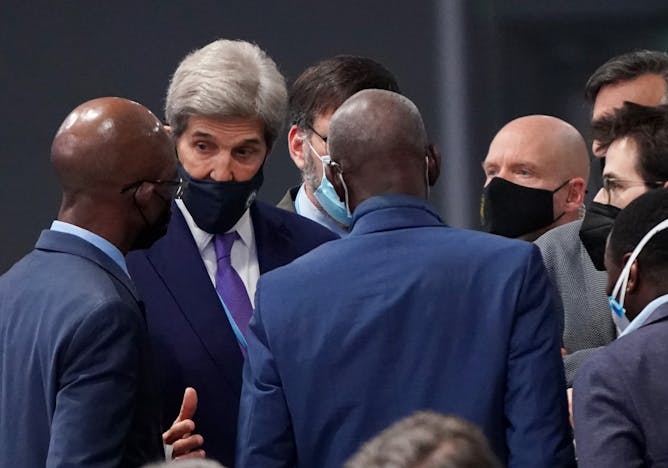|
Top headlines
Lead story
The United Nations climate summit starts this week in Dubai, and after the extraordinary heat, storms and flooding of the past year, there will be a lot of pressure on countries to take bigger steps to combat climate change.
Inside the conference, past the colorful protesters and emotional speeches, officials from countries around the world will be immersed in a world of intense negotiations. Every comma here holds meaning, and a single word can move the needle on global warming – either for better or worse.
Asif Hussain-Naviatti, a scholar in international governance who has spent years involved in climate negotiations, explains the negotiating tactics being deployed and why psychology is essential to help countries that are steeped in national self-interest embrace the common good.
[ Understand what’s going on in Washington and around the world. Get our Politics Weekly newsletter. ]
|

U.S. Special Climate Envoy John Kerry, second from left, during climate negotiations in 2021.
Ian Forsyth/Getty Images
Asif Husain-Naviatti, Columbia University
Negotiating global progress on climate change involves walking a fine line, as a former UN official explains.
|
Health + Medicine
|
-
Ty Schepis, Texas State University
Among adolescents, boys are more likely to die of an overdose than girls, and using combinations of drugs substantially raises the risk of an overdose.
|
|
Ethics + Religion
|
-
Christopher P. Scheitle, West Virginia University
Stereotypes about religion vs. science are overblown – but those assumptions can create challenges for religious grad students, a sociologist finds.
|
|
Politics + Society
|
-
Lynn Greenky, Syracuse University
The Supreme Court will hear five cases this term that will examine the nature of online discussion spaces run by social media platforms.
-
Gregory F. Treverton, USC Dornsife College of Letters, Arts and Sciences
A former chairman of the National Intelligence Council in the Obama administration shares his thoughts on what the cease fire deal means for the ongoing war in Gaza.
|
|
Environment + Energy
|
-
Aliasger K. Salem, University of Iowa
Chlorine is a widely used industrial chemical that’s frequently a factor in toxic accidents and workplace injuries. A pharmaceutical expert explains why it’s so hazardous.
-
Lucas Henneman, George Mason University
The longest-running study of its kind reviewed death records in the path of pollution from coal-fired power plants. The numbers are staggering − but also falling fast as US coal plants close.
|
|
Science + Technology
|
-
Ofer Cohen, UMass Lowell
Ever seen the northern lights? You have a magnetic layer in Earth’s atmosphere to thank for those beautiful displays. But the magnetosphere does a lot more than create auroras.
-
Sara Goldstein, University of Delaware
No matter your age, if you’re being bullied − there’s help out there.
|
|
International
|
-
C Raina MacIntyre, UNSW Sydney; Ashley Quigley, UNSW Sydney; Haley Stone, UNSW Sydney; Rebecca Dawson, UNSW Sydney
There are a number of pathogens which are reported to be causing the outbreak of respiratory illness in China.
-
Saira Bano, Thompson Rivers University
Reports of an alleged Indian plot to assassinate a Sikh separatist in the United States could undermine India-U.S. relations and both country’s efforts to counter China’s growing influence.
|
|